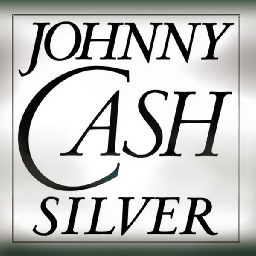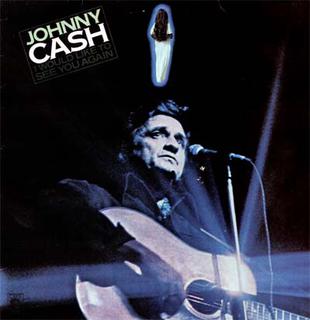
Look at Them Beans is the 52nd album by country singer Johnny Cash, released in 1975 on Columbia Records. Following an unsuccessful attempt with the previous album, John R. Cash to update Cash's sound with a new set of session musicians, Look at Them Beans reinstated The Tennessee Three as Cash's core session group.

Johnny Cash Sings the Ballads of the True West is a concept double album and the 22nd overall album released by country singer Johnny Cash, released on Columbia Records in 1965. Covering twenty individual songs, the album, as its title suggests, contains various ballads and other songs on topics related to the history of the American Old West. This includes Carl Perkins' "The Ballad of Boot Hill", "Streets of Laredo", and the sole single from the album, "Mr. Garfield", describing the shock of the population after the assassination of President James Garfield. One of the songs, "25 Minutes to Go", would later be performed at Folsom Prison and appear on Cash's famous At Folsom Prison recording in 1968, while the melody of "Streets of Laredo" would be recycled for the song "The Walls of a Prison" featured on Cash's album From Sea to Shining Sea.

From Sea to Shining Sea is a concept album and 26th album by country singer Johnny Cash, released on Columbia Records in 1968. Each track on the album was written by Cash; none of them were released as singles. The album was included on the Bear Family box set Come Along and Ride This Train.

Hello, I'm Johnny Cash is the 33rd album by American country singer Johnny Cash, released on Columbia Records in 1970. "If I Were a Carpenter", a famous duet with Cash's wife, June Carter Cash, earned the couple a Grammy Award for Best Country Performance by a Duo or Group with Vocal in 1971 ; the song also reached #2 on the Country charts. This album also includes "To Beat the Devil", the first Kris Kristofferson song covered by Cash; the two would later collaborate numerous times, most famously on "Sunday Mornin' Comin' Down". "See Ruby Fall" and "Blistered" were also released as singles, and the album itself reached #1 on the country charts and No. 6 on the pop charts. It was certified Gold on January 29, 1970 the RIAA. The album has been released on CD and it has been made available on official download sites. This album is not to be confused with a 1977 Columbia Special Products compilation LP with the same name.

Man in Black is the 38th overall album by country singer Johnny Cash, released on Columbia Records in 1971. Many of the songs on the album contain political references, either broad or specific, while the title song refers both to Cash's tendency to wear black at live shows and to the tumultuous times in which the song was created, implying the Vietnam War. The album's name also eventually became Cash's informal nickname, given to him by the public. Two tracks — "Man in Black" and "Singin' in Vietnam Talkin' Blues" — were released as singles, the former peaking at No. 3 on the Country chart. The first track features Billy Graham.

The Holy Land is a concept album, the third gospel album and 30th overall album by country singer Johnny Cash, released on Columbia Records in 1969. He recorded the album inspired by a visit to Israel with his wife, June Carter Cash and in fact most of the album consists of on-site recordings made by Cash using a portable tape recorder during a visit describing what he sees as he visits holy sites in and around Jerusalem. The remainder of the album consists of gospel songs. All but three of the songs were written by Cash, though the sole single, "Daddy Sang Bass", which reached No. 1 on the Country charts and remained that spot for six weeks, was penned by Carl Perkins.

Johnny Cash Is Coming to Town is the 73rd album by American country singer Johnny Cash, released in 1987, and his first for Mercury Records. It was re-released in 2003, paired with Boom Chicka Boom on a single CD. "Sixteen Tons" was previously a hit for Tennessee Ernie Ford, "The Big Light" is an Elvis Costello song from his album King of America, released the previous year and "Let Him Roll" is from Guy Clark's debut, Old No. 1. The album reached #36 on the country charts, while the only released single, "The Night Hank Williams Came to Town", peaked at #43.

The Adventures of Johnny Cash is an album by American country singer Johnny Cash, released on Columbia Records in 1982. The album was produced by Jack Clement.

Rockabilly Blues is an album by American country singer Johnny Cash, released on Columbia Records in 1980. Highlights include "Cold Lonesome Morning," which had some minor chart success, "Without Love," by his son-in-law, Nick Lowe, and a cover of the witty "The Twentieth Century Is Almost Over." The first two of the aforementioned songs were the only singles from the album, though "Without Love" hardly enjoyed any chart success, peaking at No. 78. "The Twentieth Century is Almost Over" was re-recorded five years later by Cash and Waylon Jennings, Willie Nelson and Kris Kristofferson, collectively known as The Highwaymen, on their first album entitled Highwayman, though it was, in essence, a duet with Nelson.

Silver is the 25th anniversary studio album by American country singer Johnny Cash, released on Columbia Records in 1979. It peaked at #28 on the Billboard albums chart. "(Ghost) Riders in the Sky" peaked at #2 on the singles chart; the two other singles, "Bull Rider" and "I'll Say It's True", had reached #66 and #42, respectively. Recordings of "Cocaine Blues" had previously appeared on At Folsom Prison and Now, There Was a Song!, under the title "Transfusion Blues" on the latter. The album was produced by Brian Ahern, who controversially introduced digital elements into the songs to the disapproval of some listeners. This is the last album that featured bassist Marshall Grant, longtime Cash collaborator in Tennessee Two. He departed from Cash's band the following year.

Gone Girl is an album by American country singer Johnny Cash, released on Columbia Records in 1978. It features the Rolling Stones' Beggars Banquet song "No Expectations", the original "It Comes and Goes" and Rodney Crowell's "A Song for the Life", as well as a version of Kenny Rogers' famous single "The Gambler", released just a month before Gone Girl. Three singles from the album, "Gone Girl", "I Will Rock and Roll with You" and "It'll Be Her", were released, but did not reach the country chart's top 20.

I Would Like to See You Again is an album by American country singer Johnny Cash, released on Columbia Records in 1978. The title track peaked at #12 on the singles chart, while "There Ain't No Good Chain Gang" reached #2; the album itself peaked at #23. The album features a pair of duets with Waylon Jennings, one of which was the "There Ain't No Good Chain Gang" single; it was one of Cash's first collaborations with Jennings, and the two recorded songs together throughout the 1980s, including a separate album entitled Heroes. Cash and Jennings would also work together as The Highwaymen with Willie Nelson and Kris Kristofferson.

A Thing Called Love is the 39th overall album by country singer Johnny Cash, released on Columbia Records in 1972. The title song, written by Jerry Reed, was released successfully as a single, reaching No. 2 on the country charts; two more singles charted as well, while the album itself also reached No. 2 on the country album charts. "A Thing Called Love" was re-recorded by Cash for Classic Cash: Hall of Fame Series (1988), while "Tear Stained Letter" was reprised on American IV: The Man Comes Around (2002). The Canadian pressing of this album has a different version of "Kate" with altered lyrics.

The Last Gunfighter Ballad is an album by American country singer Johnny Cash, released on Columbia Records in 1977. Notable tracks include the title track, "Far Side Banks of Jordan" and "That Silver Haired Daddy of Mine", the latter of which features Cash's brother Tommy Cash. The title track was the album's only single, reaching #38 on the country charts; it tells the tale of an aging gunslinger who finds himself unable to deal with the modern way of life.

Johnny Cash på Österåker is a live album by country singer Johnny Cash released on Columbia Records in 1973, making it his 43rd overall release. The album features Cash's concert at the Österåker Prison in Sweden held on October 3, 1972. Its counterparts in concept are the more notable At Folsom Prison (1968), At San Quentin (1969), and A Concert Behind Prison Walls (1976). Unlike aforementioned, På Österåker does not contain any of Cash's most well-known songs; it does, however, include a version of Kris Kristofferson's "Me and Bobby McGee". "Orleans Parish Prison" was released as a single, faring rather poorly on the charts. Cash had previously recorded "I Saw a Man" for his 1959 album, Hymns by Johnny Cash.

Johnny Cash and His Woman is an album by American country singer Johnny Cash and features his wife, June Carter Cash. It was released on Columbia Records in December 1973. It is Johnny Cash's 46th album and it peaked at No. 32 on the country album charts, his lowest chart showing up to that point.

Strawberry Cake is a live album and 53rd overall album by American singer Johnny Cash, released on Columbia Records in 1976. The album includes numerous pieces of between-song stage banter. The album includes several of Cash's most well-known early songs, such as "Big River", "I Still Miss Someone" and "Rock Island Line", as well as a number of more obscure compositions, some of which were performed by Cash for the first time; this includes "Strawberry Cake" and "Navajo". The title track was released as a single, but did poorly on the charts, peaking at No. 54.

The Junkie and the Juicehead Minus Me is the 48th album by country singer Johnny Cash, released in 1974 on Columbia Records. Although credited to Cash alone, the album includes solo performances by his daughter Rosanne Cash, and stepdaughters Rosie Nix Adams and Carlene Carter, predating the launch of their own solo careers. Two songs on the album were written by Kris Kristofferson, while "Don't Take Your Guns to Town" is a re-recording of a highly successful Cash single, his first smash hit for Columbia from back in 1958. "Father and Daughter " is a cover version of a well-known Cat Stevens song and a duet with Cash's stepdaughter, Rosie Nix Adams, with slight changes in lyrics; a version of the same song would be released in 2003 on Unearthed, as a duet with Fiona Apple. June Carter Cash also performs a solo track without her husband, one of only a couple of occasions where she did this on a Johnny Cash album outside of concert recordings.

One Piece at a Time is the 54th album by American country singer Johnny Cash, released in 1976 on Columbia Records. "One Piece at a Time," which was a #1 hit, is a humorous tale of an auto worker on the Detroit assembly line who puts together a car out of parts he swipes from the plant. "Sold Out of Flag Poles" also charted as a single, reaching #29 on the country singles charts. "Committed to Parkview", a Cash original, would be re-recorded in 1985 by Cash, Waylon Jennings, Kris Kristofferson and Willie Nelson, collectively known as The Highwaymen, on their first album, Highwayman; it is one of the few country songs sung from the perspective of a patient at a mental hospital.
"Lady" is a song written by Johnny Cash and originally recorded by him for his 1977 album The Rambler.



















